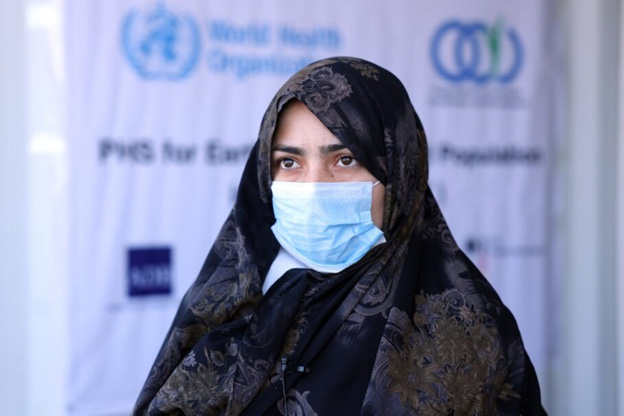 Shokria, a resident of Injil district in Herat. Copyright: WHO/Zakarya Safari
Shokria, a resident of Injil district in Herat. Copyright: WHO/Zakarya Safari
16 January 2024 – On a cold winter morning, 21-year-old Shokria visited a WHO-supported health centre close to where she lives in Herat province, western Afghanistan. On arrival, she waited with a dozen other women from the area to see a doctor. Her name was called after a short wait.
Shokria’s village in Injil district was directly affected by the earthquakes in Herat, with many houses destroyed and several schools and health centres damaged.
From 7 to 15 October 2023, a series of earthquakes and aftershocks struck Afghanistan’s Herat province, affecting more than 275 000 people across 6 districts. Overall, 1482 deaths and 2100 injuries were reported. More than 10 000 homes were destroyed, and 40 health facilities were damaged.
Like so many others in the Ab Jalil area of Injil, Shokria had been suffering from what seemed to be a seasonal cold due to the increasingly cold weather. “Since our houses are damaged, we are living in tents or temporary shelters,” Shokria said. “With unusual winds, it can get very cold in my place.”
People in earthquake-affected areas need food and permanent shelter and are also in dire need of health services. With funding from the Afghanistan Humanitarian Fund, WHO has set up 8 health centres across 4 districts in Herat to provide critical health services to the vulnerable communities.
“I would have been forced to deal with my health issues by myself at home,” said Shokria. “The new health centre is a very big hope for all of us.”
Community elders in Ab Jalil are content with the services delivered by the WHO-supported health facility. “The doctors are professional. The quality of services is very good. The medicine is useful,” said Ghulam Hussain, a village leader in Ab Jalil.
“All services, including medicine here, are free of cost,” he continued. “Many of us are not able to pay for the treatment of our health problems.”
Shokria said that before WHO set up the health centre in her village, members of the community would need to travel long distances to visit a doctor.
 Shokria visits Ab Jalil health centre to see a doctor. Copyright: Zakarya Safari
Shokria visits Ab Jalil health centre to see a doctor. Copyright: Zakarya Safari
“The hospital was far away. We didn’t have the means to get there on time. A new clinic is now functional in our village. We are very happy that this health facility is nearby. I can even go there by myself,” she said. “The clinic has both male and female staff. They are very nice to us. We feel very comfortable to share our problems with them.”
Ab Jalil health centre provides medical consultation, nutrition, midwifery and vaccination services, as well as psychosocial support, and health education.
Dr Faridoon Sultani, Regional Manager at the Organization for Community Coordination and Development (OCCD), WHO’s partner in Herat province, said health centres supported by WHO are functional at 8 sites in earthquake-affected areas. “The health centres have professional health staff and are supplied with adequate equipment and medicines. They are receiving male, female and child patients patients every day from morning till dawn,” said Dr Sultani.
 Shokria waits at the Ab Jalil health centre to see a doctor. Copyright: WHO/Zakarya Safari
Shokria waits at the Ab Jalil health centre to see a doctor. Copyright: WHO/Zakarya Safari
“With support from WHO, we have been delivering essential health services in all earthquake-affected areas during the first 100 days of the earthquakes,” Dr Sultani added. “These new health centres will continue to deliver health services in the earthquake-affected areas for 3 months now but the needs are more. I hope we can continue to support them for the longer term.”


